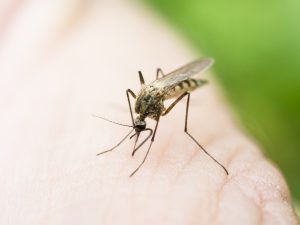
DOVER – A 70-year-old Kent County woman was briefly hospitalized with West Nile virus (WNV) and is now recovering at home. The case is the first lab-confirmed human WNV case reported in 2017. There were no cases in 2016. The mosquito-borne illness can become serious and the Division of Public Health (DPH) reminds people to take precautions to avoid mosquito bites.
The Department of Natural Resources and Environmental Control (DNREC) recently announced the continued presence of West Nile virus in sentinel chickens monitored for mosquito-borne diseases. Mosquitoes remain very active, especially during the unseasonably warm weather the state is now experiencing.
“This new case is a reminder that West Nile virus is still active in Delaware,” said DPH Director Dr. Karyl Rattay. “It is just as important during these unseasonably warm fall months as it was in the summer to protect yourself and your loved ones from mosquito bites. These bites can cause much more serious health problems than just itching and discomfort.”
WNV is transmitted by mosquitoes, generally in summer and fall, with a peak period for disease transmissions from mid-August to mid-October. Although nearly 80 percent of people infected with WNV will not become ill, and only a little less than 20 percent of those infected will develop West Nile fever, with mild symptoms (fever, headache, body aches, a skin rash on the chest or back and swollen lymph glands), one in 150 people infected will develop severe infection (West Nile encephalitis or meningitis).
Symptoms of severe WNV infection include headache, high fever, stiff neck, and/or tremors and muscle weakness. The elderly and those with weakened immune systems are most at risk. Anyone who experiences any of these severe symptoms should seek medical help immediately. Symptoms may progress to stupor, disorientation, coma, convulsions, paralysis, and possibly death.
WNV is primarily transmitted to humans by the common house mosquito, while the Asian tiger mosquito can also carry the disease. Mosquitoes in Delaware can also carry viruses which may result in death including Eastern equine encephalitis (EEE), which can cause brain inflammation and be fatal to humans and horses, and dengue virus. Other mosquito-borne diseases that could occur in Delaware include chikungunya, which while rarely fatal, may result in severe and debilitating symptoms including fever and joint pain, and Zika. To date no cases of Zika have been linked with local mosquito or human transmission. To avoid mosquito bites and reduce the risk of infection, individuals should:
- When outside, wear shoes, long-sleeved shirts, and pants. Mosquito netting can protect one’s face and neck, and infants in carriages, strollers, and playpens. Mosquitoes are most active at dusk and during the early-morning hours.
- Use Environmental Protection Agency (EPA)-registered insect repellents. Follow the manufacturer’s instructions for reapplication times.
- Do not use insect repellent on babies younger than 2 months of age. Dress your child in clothing that covers arms and legs. Do not apply insect repellent onto a child’s hands, eyes, mouth, or on cut or irritated skin. Adults: Spray insect repellent onto your hands and then apply to the child’s face.
- Prevent mosquitoes from entering the house by using screens and keeping windows and doorways tightly sealed.
- To reduce mosquito-breeding habitat, drain or remove items that collect water, such as discarded buckets or containers, uncovered trash cans, stagnant birdbaths, unprotected rain barrels or cisterns, old tires, upright wheelbarrows, flowerpot liners, depressions in tarps covering boats, clogged rain gutters, corrugated downspout extenders, and unused swimming pools.
To report suspected cases of human WNV, call the DPH Office of Infectious Disease Epidemiology at 888-295-5156.
To report high numbers of biting mosquitoes, contact the Department of Natural Resources and Environmental Control (DNREC) Mosquito Control Section field offices:
- Glasgow Office (upstate) – 302-836-2555, for all of New Castle County and the northern half of Kent County, including Dover.
- Milford Office (downstate) – 302-422-1512, for the southern half of Kent County south of Dover, and for all of Sussex County.
Calls will be answered by staff from Monday through Friday between 8:00 a.m. and 4:00 p.m. Callers after business hours or during weekends or holidays should leave their name, phone number, address and a brief message.
For more information on DNREC Mosquito Control, call 302-739-9917 or visit dnrec.delaware.gov/fw/Services/Pages/MosquitoSection.aspx.
For more information about WNV in horses, contact the Delaware Department of Agriculture at 302-698-4500 or 800-282-8685 (Delaware only).
For more general information on WNV, visit cdc.gov/ncidod/dvbid/westnile/index.htm.
A person who is deaf, hard-of-hearing, deaf-blind or speech-disabled can call the DPH phone number above by using TTY services. Dial 7-1-1 or 800-232-5460 to type your conversation to a relay operator, who reads your conversation to a hearing person at DPH. The relay operator types the hearing person’s spoken words back to the TTY user. To learn more about TTY availability in Delaware, visit http://delawarerelay.com.
Delaware Health and Social Services is committed to improving the quality of the lives of Delaware’s citizens by promoting health and well-being, fostering self-sufficiency, and protecting vulnerable populations. DPH, a division of DHSS, urges Delawareans to make healthier choices with the 5-2-1 Almost None campaign: eat 5 or more fruits and vegetables each day, have no more than 2 hours of recreational screen time each day (includes TV, computer, gaming), get 1 or more hours of physical activity each day, and drink almost no sugary beverages.